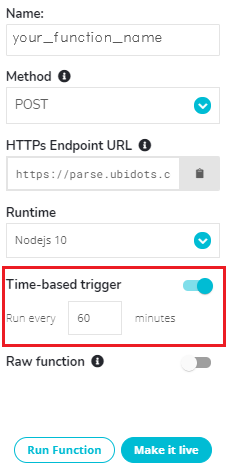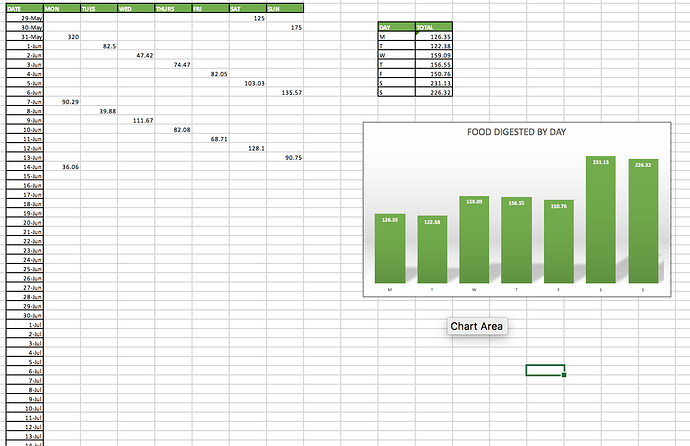Good day @psalibe
About the question you made in the past months, if you want to do this through synthetic variables, it could be a bit more complicated, since you would probably need to send each dot with a key context that indicates the day of the week and this would also imply using a lot of synthetic variables to be able to compute the accumulated of each day. For this kind of problem, I would recommend using Ubifunctions. Below I share the code of a function to compute an accumulated summation for each day of the week as you desire:
//CONST DEFINITION
const axios = require('axios');
const BASE_URL = 'https://industrial.api.ubidots.com'
const TOKEN = 'YOUR-UBIDOTS-TOKEN-HERE';
const deviceLabel = 'YOUR-DEVICE-LABEL-HERE';
const variableLabel = 'YOUR-VARIABLE-LABEL-HERE';
//VARIABLE LABELS FOR EACH WEEKDAY
const ACCUMULATED_VARIABLES = {
0: {label: 'acc_sundays', id: 'ID_sundays'},
1: {label: 'acc_mondays', id: 'ID_mondays'},
2: {label: 'acc_tuesdays', id: 'ID_tuesdays'},
3: {label: 'acc_wednesdays', id: 'ID_wednesdays'},
4: {label: 'acc_thursdays', id: 'ID_thursdays'},
5: {label: 'acc_fridays', id: 'ID_fridays'},
6: {label: 'acc_saturdays', id: 'ID_saturdays'}
}
async function main(args) {
//INITIALIZE CUMULATIVES
var CUMULATIVES = {
'monday': 0,
'tuesday': 0,
'wednesday': 0,
'thursday': 0,
'friday': 0,
'saturday': 0,
'sunday': 0
}
//GET ACTUAL TIME
let [initTimestamp, finalTimestamp] = getTimestampRange();
//QUERY PARAMS TO GET ALL DATA
var queryParams = {
start: initTimestamp,
end: finalTimestamp
}
//GET ALL DATA
var responseAll = await getData(deviceLabel, variableLabel , queryParams, TOKEN);
//DAYS WITH CHANGES
var weekdays = [];
responseAll["results"].forEach((value) => {
let actualTimestamp = new Date(value['timestamp']);
let day = actualTimestamp.getUTCDay();
if (!weekdays.includes(ACCUMULATED_VARIABLES[day]['id'])) {
weekdays.push(ACCUMULATED_VARIABLES[day]['id']);
}
let actualVariableLabel = ACCUMULATED_VARIABLES[day]['wday'];
CUMULATIVES[actualVariableLabel] += value['value'];
});
//QUERY PARAMS TO GET CUMULATIVES LAST VALUES
var queryParams = {
fields: 'lastValue,label',
id__in: weekdays.toString()
}
//GET CUMULATIVES
var responseCumulatives = await getCumulatives(queryParams, TOKEN);
//CREATE THE PAYLOAD TO SEND TO UBIDOTS
var payload = {};
responseCumulatives["results"].forEach((element) => {
var variableLabel = element['label'];
var lastValue = element['lastValue']['value'] + CUMULATIVES[variableLabel];
payload[variableLabel] = lastValue;
});
//POST A UBIDOTS
var postResponse = await ubidotsUpdateDevice(deviceLabel, payload, TOKEN);
return postResponse;
}
//GET TIME
function getTimestampRange() {
let now = new Date();
let hour = now.getHours();
now.setMinutes(0);
now.setSeconds(0);
let finalTimestamp = now.setMilliseconds(0);
let initTimestamp = now - 3600000;
return [initTimestamp, finalTimestamp];
}
//GET FROM UBIDOTS (RAW VARIABLE)
async function getData(deviceLabel, variableLabel, queryParams, token) {
var url = `${BASE_URL}/api/v1.6/devices/${deviceLabel}/${variableLabel}/values`;
var config = {
headers: {'X-Auth-Token': token },
params: queryParams
};
var response = await axios.get(url, config);
return response.data;
}
//GET FROM UBIDOTS (CUMULATIVES)
async function getCumulatives(queryParams, token) {
var url = `${BASE_URL}/api/v2.0/variables/`;
var config = {
headers: {'X-Auth-Token': token },
params: queryParams
};
var response = await axios.get(url, config);
return response.data;
}
//POST TO UBIDOTS
async function ubidotsUpdateDevice(deviceLabel, payloa, token) {
let config = {
method: 'POST',
url: 'https://industrial.api.ubidots.com/api/v1.6/devices/' + deviceLabel,
data: payload,
headers: {
'Content-Type': 'application/json',
'X-Auth-Token': token
}
}
const response = await axios.request(config);
return response.data;
}
Firstly, you need to define the constants of your UbiFunction:
-
Axios library and the BASE_URL are necessary to perform the requests.
- The
TOKEN, deviceLabel and variableLabel must be replaced with the specific data of your account (the latters are the labels of the device and the variable from which the raw data will be retrieved).
//CONST DEFINITION
const axios = require('axios');
const BASE_URL = 'https://industrial.api.ubidots.com'
const TOKEN = 'YOUR-UBIDOTS-TOKEN-HERE';
const deviceLabel = 'YOUR-DEVICE-LABEL-HERE';
ACCUMULATED_VARIABLES is an object that specifies every weekday accumulated variable label and each variable ID for every accumulated variable. You need to replace the id portion with what will be the accumulated variables in your account.
Make sure to create the accumulated variables with the labels herein:
//VARIABLE LABELS FOR EACH WEEKDAY
const ACCUMULATED_VARIABLES = {
0: {label: 'acc_sundays', id: 'ID_sundays'},
1: {label: 'acc_mondays', id: 'ID_mondays'},
2: {label: 'acc_tuesdays', id: 'ID_tuesdays'},
3: {label: 'acc_wednesdays', id: 'ID_wednesdays'},
4: {label: 'acc_thursdays', id: 'ID_thursdays'},
5: {label: 'acc_fridays', id: 'ID_fridays'},
6: {label: 'acc_saturdays', id: 'ID_saturdays'}
}
At the end, you need only to configure the UbiFunction to be triggered every 60 minutes:

NOTE: bear in mind that this UbiFunction will only start accumulating from the moment you deploy it. If you raw variable contains historical data, this won’t be retroactively considered.
All the best,
Ángela

